

Special Issue : Creatine Supplementation for Health and Clinical Diseases. Special Issue Editors Prof.

Dr. Richard B. KreiderWebsite Guest Editor. Dietary Nitrate and Nitrite Concentrations in Food Patterns... : Nutrition Today. Dietary nitrate and nitrite are found primarily in green leafy vegetables and root vegetables, such as spinach and beets, and have become popular because of potential cardiovascular health benefits.1 Dietary nitrate is reduced to nitrite in saliva by bacteria on the tongue and further metabolized to nitric oxide (NO) and various nitrogen oxide metabolites in the stomach before being circulated through the blood after absorption.2 In conditions of low oxygen availability such as living at high altitudes and exercise-induced hypoxia in muscle, nitrite can be converted into NO, a free radical gas that serves as a signaling molecule essential for endothelial function and metabolic regulation.
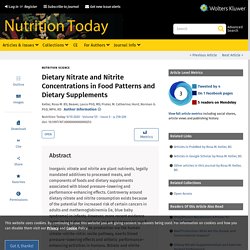
Through these mechanisms, dietary nitrate consumption increases plasma nitrite concentration, reduces resting blood pressure, and improves vascular function.3 A conundrum exists concerning the potential health benefits and risks associated with consumption of dietary nitrate and nitrite. 1. 2. Magnesium and Pain. 2.

Mechanism of Antinociceptive Action of Magnesium Although magnesium has no direct antinociceptive effects, it inhibits calcium ions from entering cells by blocking NMDA receptors, resulting in an analgesic effect. This analgesic effect is related to the prevention of central sensitization caused by peripheral tissue injury [3]. Central sensitization occurs due to the enhancement of neuronal properties in the nociceptive pathways of the central nervous system. It is triggered by repetitive nociceptive afferent inputs and eventually manifests as a prolonged reduction in the pain threshold.
Role of Vitamins in Skin Health: a Systematic Review. 1.Moise AR, Noy N, Palczewski K, Blaner WS.
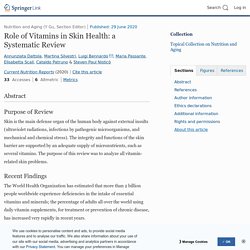
Delivery of retinoid-based therapies to target tissues. Biochemistry. 2007;46(15):4449–58.CAS PubMed PubMed Central Google Scholar 2.Antille C, Tran C, Sorg O, Saurat JH. Copper Deficiency July 2020. Guidance Regarding the Recommendation and Sale of Dietary Supplements - Journal of the Academy of Nutrition and Dietetics. Olive Leaf (Olea europaea L. folium): Potential Effects on Glycemia and Lipidemia - FullText - Annals of Nutrition and Metabolism. UPDATE: The FDA Warns that Biotin May Interfere with Lab Tests: FDA Safety Communication. Date Issued: November 5, 2019 The U.S.
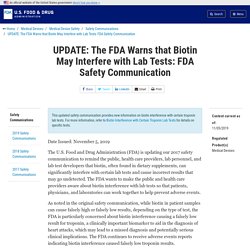
Food and Drug Administration (FDA) is updating our 2017 safety communication to remind the public, health care providers, lab personnel, and lab test developers that biotin, often found in dietary supplements, can significantly interfere with certain lab tests and cause incorrect results that may go undetected. The FDA wants to make the public and health care providers aware about biotin interference with lab tests so that patients, physicians, and laboratories can work together to help prevent adverse events. As noted in the original safety communication, while biotin in patient samples can cause falsely high or falsely low results, depending on the type of test, the FDA is particularly concerned about biotin interference causing a falsely low result for troponin, a clinically important biomarker to aid in the diagnosis of heart attacks, which may lead to a missed diagnosis and potentially serious clinical implications.
FDA Actions Questions. The Paradox of Coenzyme Q10 in Aging. 3.2.

CoQ10 Supplementation in Aging: Effects on Life span and Longevity The possibility of increasing CoQ10 levels in different organs or tissues through dietary supplementation has been widely explored in recent decades. Studies in rodents [153,154,155,156,157] suggest that CoQ10 administration is able to increase the amounts of CoQ10 in plasma and liver significantly, and in heart, kidney and skeletal muscle moderately. Similarly, different authors have reported increased systemic levels of CoQ10 in humans after supplementing with CoQ10 at different daily doses (100 to 2400 mg) and duration (20 days, 3 or even 16 months) in multiple trials [158,159,160,161,162].
Regarding the safety of CoQ10 supplements, different assessments in human and animals (reviewed by Hidaka et al. [163]) concluded that the endogenous biosynthesis of CoQ10 is not influenced by exogenous inputs. Table 1. 3.3. CoQ10 therapy has also been tested in non-metabolic or cardiovascular diseases. Table 2. 3.2. Table 1. Lutein across the Lifespan: From Childhood Cognitive Performance to the Aging Eye and Brain. We use cookies to enhance your experience on our website.By continuing to use our website, you are agreeing to our use of cookies.
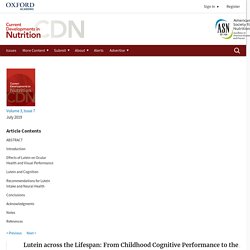
You can change your cookie settings at any time. <a href=" Find out more</a> Skip to Main Content Sign In Register Close Advanced Search Article Navigation Volume 3 Issue 7 July 2019 Article Contents Lutein across the Lifespan: From Childhood Cognitive Performance to the Aging Eye and Brain James M Stringham. Product indiscriminate use of vitamin risks: A review: Critical Reviews in Food Science and Nutrition: Vol 0, No 0. Most of the population does not seek professional advice before taking vitamin products and their indiscriminate use can lead to serious health risks.
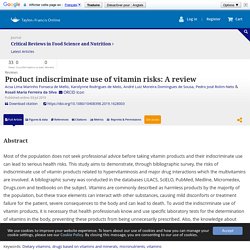
This study aims to demonstrate, through bibliographic survey, the risks of indiscriminate use of vitamin products related to hypervitaminosis and major drug interactions which the multivitamins are involved. Effects of Supplements and Dietary Interventions on Cardiovascular Outcomes. The Real Deal on Brain Health Supplements: GCBH Recommendations on Vitamins, Minerals, and Other Dietary Supplements. Intestinal Absorption and Factors Influencing Bioavailability of Magnesium-An Update. Important drug-micronutrient interactions: A selection for clinical practice: Critical Reviews in Food Science and Nutrition: Challenges in the Diagnosis of Magnesium Status.
Interpreting magnesium status to enhance clinical care: key... : Current Opinion in Clinical Nutrition & Metabolic Care. To update advances in identifying factors affecting magnesium (Mg) status that assist in providing improved evidence-based clinical decision-making for assessing Mg status.
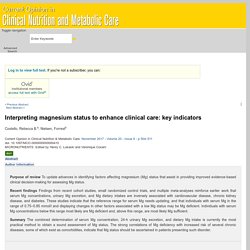
2017 ODS Dietary Supplement Research Practicum. ISSN position stand: safety and efficacy of creatine supplementation in exercise, sport, and medicine. Since creatine monohydrate became a popular dietary supplement in the early 1990s, over 1,000 studies have been conducted and billions of servings of creatine have been ingested.
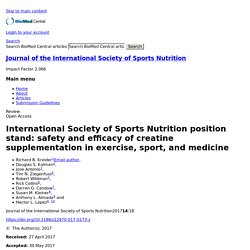
The only consistently reported side effect from creatine supplementation that has been described in the literature has been weight gain [5, 22, 46, 78, 91, 92, 112]. Available short and long-term studies in healthy and diseased populations, from infants to the elderly, at dosages ranging from 0.3 to 0.8 g/kg/day for up to 5 years have consistently shown that creatine supplementation poses no adverse health risks and may provide a number of health and performance benefits. Are dietary supplements and nutraceuticals effective for musculoskeletal health and cognitive function? A scoping review. Lactic Acidosis: A Lesser Known Side Effect of Thiamine Deficiency. Dietary Supplements for Weight Loss — Health Professional Fact Sheet. Introduction This fact sheet provides information on weight-loss dietary supplements*, including summaries of research on the safety and efficacy of several of the most commonly used ingredients in these products.
Dietary supplements for pain during menstruation. We included 27 RCTs (3101 women). Most included studies were conducted amongst cohorts of students with primary dysmenorrhoea in their late teens or early twenties. Twenty-two studies were conducted in Iran and the rest were performed in other middle-income countries. Only one study addressed secondary dysmenorrhoea. Are Menopause Supplements Effective? March 2016 Issue Women's Health: Are Menopause Supplements Effective? By Judith C. Thalheimer, RD, LDN Today's Dietitian Vol. 18 No. 3 P. 18 Today's Dietitian reviews what the research says and which brands are better than others.
Women who experience the various symptoms of menopause may turn to over-the-counter (OTC) supplements to ease their discomfort. Do Cinnamon Supplements Have a Role in Glycemic Control in Type 2 Diabetes? A Narrative Review. Magnesium – So Underappreciated.